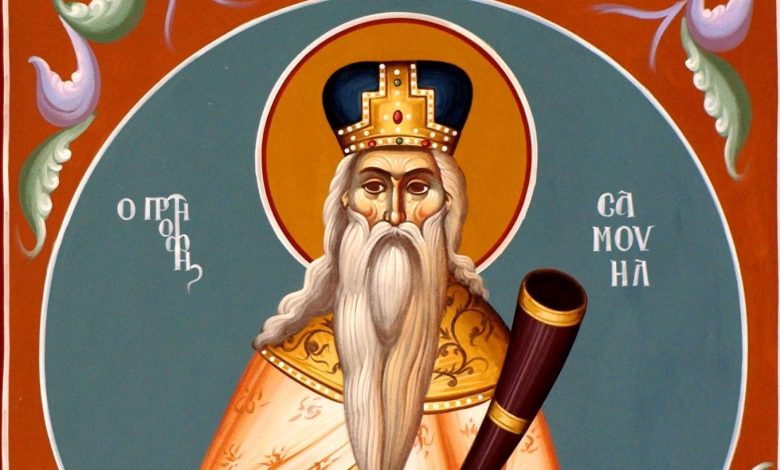Prophet Samuel (20 August)

The Prophet Samuel was the fifteenth and last of the Judges of Israel, living more than 1146 years before the Birth of Christ. He was descended from the Tribe of Levi, and was the son of Elkanah from Ramathaim-Zophim of Mount Ephraim. He was born, having been besought from the Lord through the prayers of his mother Hannah (therefore he received the name Samuel, which means “besought from God”). Even before birth, he was dedicated to God. Her song, “My heart exults in the Lord,” is the third Old Testament ode of the Canon (1 Sam/1 Kings 2:1-10).
When the boy reached the age of three, his mother went with him to Shiloh and in accord with her vow dedicated him to the worship of God. She gave him into the care of the High Priest Eli, who at this time was a judge over Israel. The prophet grew in the fear of God, and at twelve years of age he had a revelation that God would punish the house of the High Priest Eli, because he did not restrain the impiety of his sons. Eli’s whole family was wiped out in a single day.
The prophecy was fulfilled when the Philistines, having slain in battle 30,000 Israelites (among them Hophni and Phinees, the sons of Eli the High Priest), gained victory and captured the Ark of the Covenant. Hearing this, the High Priest Eli fell backwards from his seat at the gate, and breaking his back, he died. The wife of Phinees, upon hearing what had happened in this very hour, gave birth to a son (Ichabod) and died with the words: “The glory has departed from Israel, for the Ark of God is taken away” (1 Sam/1 Kgs 4: 22).
Upon the death of Eli, Samuel became the judge of the nation of Israel. The Ark of God was returned by the Philistines on their own initiative. After returning to God, the Israelites returned to all the cities that the Philistines had taken. In his old age, the Prophet Samuel made his sons Joel and Abiah judges over Israel, but they did not follow the integrity and righteous judgment of their father, since they were motivated by greed.
Then the elders of Israel, wanting the nation of God to be “like other nations” (1 Sam/1 Kgs 8: 20), demanded of the Prophet Samuel that they have a king. The Prophet Samuel anointed Saul as king, but saw in this a downfall of the people, whom God Himself had governed until this time, announcing His will through “judges,” His chosen saints. Resigning the position of judge, the Prophet Samuel asked the people if they consented to his continued governance, but no one stepped forward for him.
After denouncing the first king, Saul, for his disobedience to God, the Prophet Samuel anointed David as king. He had offered David asylum, saving him from the pursuit of King Saul. The Prophet Samuel died in extreme old age. His life is recorded in the Bible (1 Sam/1 Kgs; Sirach 46:13-20).
In the year 406 A.D. the relics of the Prophet Samuel were transferred from Judea to Constantinople.

This most holy man, a Prophet of God from childhood, was the last judge of the Israelite people, and anointed the first two Kings of Israel. He was born in the twelfth century before Christ, in the city of Armathaim Sipha, from the tribe of Levi, the son of Elkanah and Hannah (Anna). He was the fruit of prayer, for his mother, being barren, conceived him only after she had supplicated the Lord with many tears; wherefore she called him Samuel, that is, “heard by God.” As soon as Hannah had weaned him, she brought him to the city of Silom (Shiloh), where the Ark was kept, and she consecrated him, though yet a babe, to the service of God, giving thanks to Him with the hymn found in the Third Ode of the Psalter: “My heart hath been established in the Lord . . .” Samuel remained in Silom under the protection of Eli the priest. He served in the Tabernacle of God, and through his most venerable way of life became well-pleasing to God and man (I Kings 2: 26). While yet a child, sleeping in the tabernacle near the Ark of God, he heard the voice of God calling his name, and foretelling the downfall of Eli; for although Eli’s two sons, Ophni and Phineas, were most lawless, and despisers of God, Eli did not correct them. Even after Samuel had told Eli of the divine warning, Eli did not properly chastise his sons, and afterwards, through various misfortunes, his whole house was blotted out in one day.
After these things came to pass, Samuel was chosen to be the protector of the people, and he judged them with holiness and righteousness. He became for them an example of all goodness, and their compassionate intercessor before God: “Far be it from me that I should sin against the Lord in ceasing to pray for you; yea, I will serve the Lord, and show you the good and the right way” (ibid. 12:23). When he asked them — having God as witness — if he ever wronged anyone, or took anyone’s possessions, or any gift, even so much as a sandal, they answered with one voice: “Thou hast not defrauded us, nor oppressed us, nor afflicted us, neither hast thou taken anything from anyone’s hand” (ibid. 12:4). When Samuel was old, the people asked him for a king, but he was displeased with this, knowing that God Himself was their King. But when they persisted, the Lord commanded him to anoint them a king, saying, “They have not rejected thee, but they have rejected Me from reigning over them” (ibid. 8:7); so Samuel anointed Saul. But Saul transgressed the command of God repeatedly, so Samuel anointed David. Yet, since Samuel was a man of God, full of tender mercy, when the Lord told him that He had rejected Saul, Samuel wept for him the whole night long (ibid. 15:11); and later, since he continued to grieve, the Lord said to him, “How long wilt thou mourn for Saul?” (ibid. 16:1). Having lived blamelessly some ninety-eight years, and become an example to all of a God-pleasing life, he reposed in the eleventh century before Christ. Many ascribe to him the authorship of the Books of judges, and of Ruth, and of the first twenty-four chapters of the First Book of Kings (I Samuel).
Samuel was the fifteenth and last judge of Israel. He lived eleven hundred years before Christ. Samuel was born of the tribe of Levi, of the parents Elkanah and Hannah, in a place called Ramatha (or Arimathea), where noble Joseph would later be born [Joseph of Arimathea]. Through weeping, the barren Hannah besought from God the child Samuel and dedicated him to God when he was three years of age. Living in Shiloh, near the Ark of the Covenant, Samuel had a true revelation from God in his twelfth year, concerning the punishments that were pending for the house of the high priest Eli because of the immorality of his sons Hophni and Phineas. That revelation soon materialized: the Philistines defeated the Israelites, slew both of Eli’s sons, and captured the Ark of the Covenant. When the messenger informed Eli of this tragedy, Eli fell to the ground dead, in the ninety-eighth year of his life. The same thing occurred to his daughter-in-law, the wife of Phineas. For twenty years, the Israelites were the slaves of the Philistines. After that, God sent Samuel to the people to preach repentance–if they desired salvation from their enemies. The people repented, rejected the pagan idols that they served, and recognized Samuel as a prophet, priest and judge. Samuel then set out with an army against the Philistines. With God’s help he confused and defeated them, and liberated Israel. After that, Samuel peacefully judged his people until old age. Considering his old age, the people asked him to install a king for them in his place. In vain, Samuel tried to dissuade them from this, saying to them that God was their only true King, but the people stubbornly insisted. Even though this was not pleasing to God, He commanded Samuel to annoint Saul, the son of Kish from the tribe of Benjamin, as their king. Saul reigned for a short time only, before God rejected Saul because of his impudence and disobedience. God then commanded Samuel to annoint Jesse’s son, David, as king in Saul’s place. Before his death, Samuel gathered the entire people and bid them farewell. When Samuel died, all of Israel mourned for him, and they buried him honorably in his house at Ramatha.
Apolytikion of Prophet Samuel
Second Tone
As we celebrate the memory of Thy Prophet Samuel, O Lord, through him we beseech Thee to save our souls.
Source: oca.org / goarch.org / westserbdio.org




